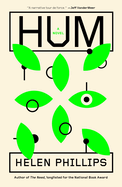
The challenges of motherhood in an advanced technological age is the intriguing premise behind Hum by Helen Phillips (The Need). Set in an unnamed, colorless city in the near future, Phillips's ingenious sixth novel accelerates many of our present-day concerns about artificial intelligence. Hum contrasts technology's nonbiological competence with a mother's human fallibility, and provokes readers to ponder the limits and distortions of each.
May and her husband, Jem, are a financially strapped couple with two children, Lu and Sy. Bad air quality, a lack of greenery under a birdless, climate-ravaged sky, and 24-hour surveillance form the ominous backdrop of their city life, the air "abuzz with data." Robots called "hums" are ubiquitous, performing tasks as varied as doctor assistants and government workers.
Against this futuristic scenery, Phillips's protagonist is a timeless portrayal of maternal love and angst, doing her best to juggle family responsibilities and maintain her sanity. May recently lost her job refining AI capabilities because the system she was working on soon "exceeded human training." Desperate to make ends meet, she participates in an experimental trial in exchange for a large lump-sum payment. May then splurges on a family vacation to the Botanical Garden, the catalyst for a series of calamitous events that will call into question everything she holds dear in her life.
Phillips cuts through the bleakness of the fictitious world she has created by transporting readers deep inside May's psyche, the tumultuous beating heart of the novel, to witness the tender humanity no amount of technological advancement can destroy. --Shahina Piyarali

